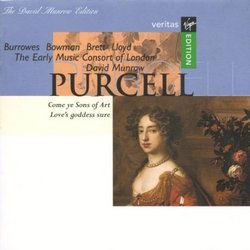Early period performance
Leslie Richford | Selsingen, Lower Saxony | 01/21/2005
(4 out of 5 stars)
"In the mid-70?s two recordings of Purcell?s Ode ?Come Ye Sons of Art? were made in London, with a number of musicians from the burgeoning early music scene appearing in both productions. David Munrow?s version, plus ?Love?s Goddess Sure?, was produced at the Abbey Road studios in June 1975, being performed with period instruments. John Eliot Gardiner recorded the ode and the Funeral Music for Queen Mary for Erato Records at Rosslyn Hill Chapel in February 1976 (the disc has been re-released at budget price on Warner?s new Apex label). Among the soloists, it was countertenor Charles Brett who sang at both sessions, joining James Bowman on the Munrow disc and taking the role of the first countertenor (assisted by John Williams) on the Gardiner. The choir of the Early Music Consort includes well-known names such as David James, Rogers Covey-Crump and Paul Elliott (all to become regular members of the Hilliard Ensemble); the choir has countertenors instead of altos and sings without a good deal of vibrato, in contrast to Gardiner?s Monteverdi Choir, which at that time was not the period performance choir it is famous as today. Both recordings both wonderful instrumentalists: the Munrow has Simon Standage, Monica Huggett, Catherine Mackintosh, Duncan Druce and Micaela Comberti among the violins; Trevor Jones is one of three viola players, and Munrow uses bass viols (and a violone) instead of Gardiner?s double bass and has Christopher Hogwood marvellously playing the organ in the continuo (and some lovely oboe playing by Anthony Camden and Tess Miller). On the Gardiner, the Monteverdi Orchestra, not yet become the English Baroque Soloists, uses modern instruments, but with players such as Trevor Pinnock, harpsichord, and Barry Guy, double bass. Gardiner?s ?Funeral Music? is performed with the Equale Brass Ensemble which includes Michael Laird on the trumpet and David Corkhill on the timpani (as on the Munrow recording).
Taken as a whole, there is little to choose between both recordings, despite some considerable differences. Gardiner takes the opening symphony at a very relaxed tempo, but then proceeds to outstrip Munrow on all the sung numbers. The modern instruments and the rather obvious vibrato of choir and soloists dampen my enthusiasm for the Gardiner somewhat, although I think he has the edge as far as sound quality is concerned. But Munrow?s soloists are definitely more appropriate, and James Bowman?s countertenor is here unbeatable. Personally, I also prefer Norma Burrowes as soprano here, because her voice seems lighter and more airy than Felicity Lott?s. The basses on both recordings (Robert Lloyd on the Munrow, Thomas Allen on the Gardiner) are rather stentorian; I would have preferred a less aggressive baritone.
All in all, if I had to choose, I think I would go for the Munrow rather than the Gardiner, but it is certainly worth making the comparison. In any case, both recordings are now nearly 30 years old, so one cannot expect them to sound quite like what they would do if they had been recorded a quarter of a century later.
"
Purcell en su máxima expresion
Leopoldo Parra Reynada | México City, D.F. Mexico | 03/29/2000
(5 out of 5 stars)
"Este disco fue en el que originalmente conocí la obra de Henry Purcell (a pesar de que sin duda alguna su obra más conocida es la música para los funerales de la reina María); sin embargo, este disco resulta sensacional debido a la interpretación fenomenal que Munrow imprime a la obra. El papel que hacen Bowman y Brett en "Come ye sons of art" es fabuloso, y hasta la fecha he escuchado pocos contra-tenores de esa calidad interpretativa. No sé por qué la música de los cumpleaños de la reina María no tiene tanta difusión, ya que resulta uno de los ejemplos más claros del temprano barroco"


 Track Listings (18) - Disc #1
Track Listings (18) - Disc #1